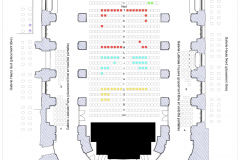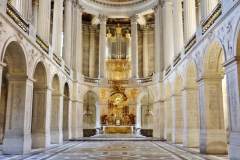Haendel: Solomon
January 2025 | ||||||
|---|---|---|---|---|---|---|
Mo | Tu | We | Th | Fr | Sa | Su |
Oratorio in three acts to an anonymous libretto, first performed in London in 1749.
Show in English with French surtitles
Synopsis
Act 1
The work begins with Solomon and his people celebrating the consecration of the Temple he has built in Jerusalem. Solomon rejoices in his married happiness to his one wife (unlike the biblical Solomon, who is stated to have had hundreds of wives and concubines), and promises to build his queen a palace for her. They express their love for each other and retire for the night as flower-scented breezes and nightingales' songs lull them to rest.
Act 2
The wisdom of Solomon is presented in the famous biblical story of two harlots who each claimed a single baby as her own. Solomon offers to solve the case by splitting the infant in half with his sword, but the real mother rejects this solution and offers to hand the child over to the other woman, as Solomon knew the true parent would do. The First Harlot and the chorus praise Solomon's judgement.
Act 3
In Act Three we see a state visit from the Queen of Sheba to Solomon's kingdom. The king and his people entertain her with a musical masque of magnificent choruses depicting in turn the "lulling" sound of gentle music, the desire for military glory, the despair of an unhappy lover, and a storm which turns to calm. All celebrate the Israel of the wise ruler Solomon as a Golden Age of peace, happiness, and prosperity.
Program and cast
VIP CATEGORY: Best seats in house with complimentary glass of champagne and programme.
PRESTIGE CATEGORY: Excellent seats with complimentary glass of champagne and programme.
Tim Mead: Solomon
Rowan Pierce: Queen of Solomon
Hilary Cronin: First Harlot
Frances Gregory: Second Harlot
Anna Dennis: Queen of Sheba
James Way: Zadok
Morgan Pearce: A Levite
Gabrieli Consort and Players
Paul McCreesh: Conductor
Royal Chapel of Versailles
The Royal Chapel was finished in 1710 at the end of Louis XIV’s reign. Jules Hardouin-Mansart proposed the plan to the King in 1669. The First Architect died in 1708 without seeing the end of the works which were taken over by his brother-in-law Robert De Cotte. The reigning monarch only came for major religious festivals where he received communion, for ceremonies of the Order of Saint-Esprit, for the baptisms and weddings of the royal children celebrated from 1710 to 1789. This exceptional palatine chapel was also used for a wide range of religious ceremonies, including the marriage of Archduchess Marie-Antoinette with the future Louis XVI.
Above the altar, around the organ by Clicquot decorated with a fine relief of King David, played by great masters like François Couperin, the Chapel’s music, famous all over Europe, sung motets everyday during all religious services. Today Handel’s Dixit Dominus or Messiah, Bach’s Oratorios, Magnificat, Cantatas or Passions, Pergolesi’s Stabat Mater or Charpentier’s Te Deum ring out in this majestic architecture.

 EN
EN DE
DE IT
IT FR
FR ES
ES RU
RU JP
JP RO
RO
 Seating plan
Seating plan 